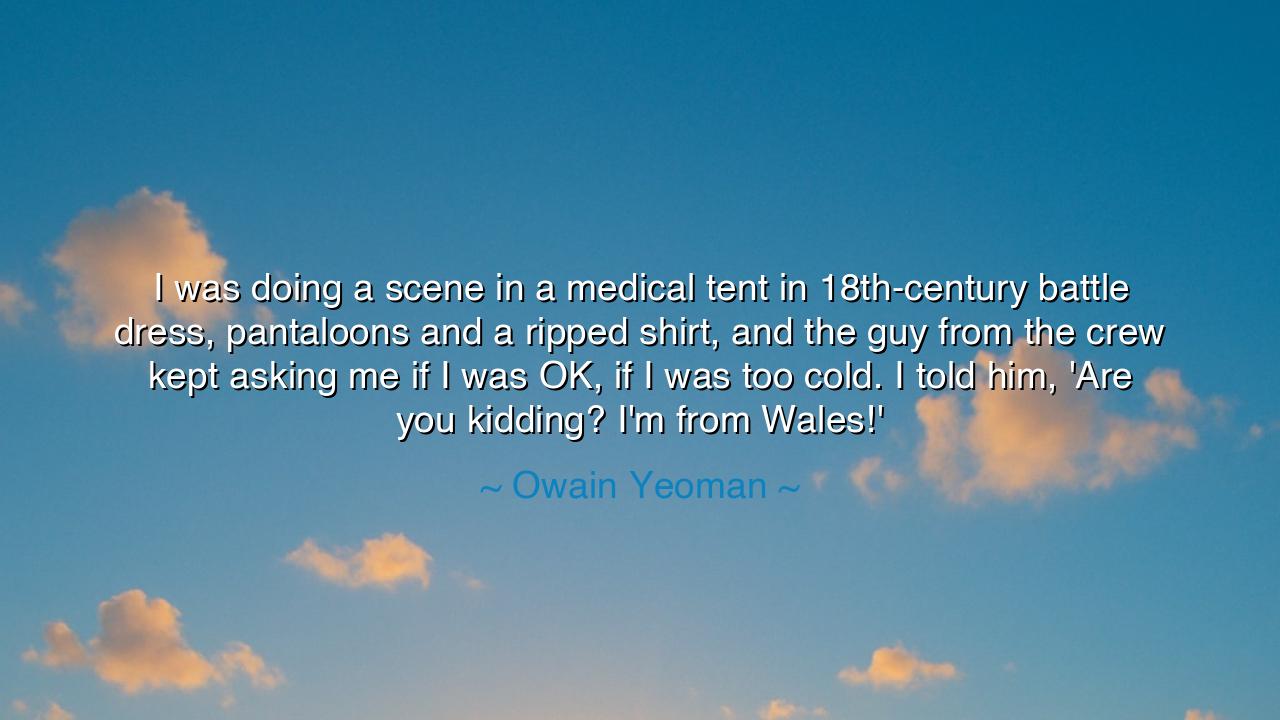
I was doing a scene in a medical tent in 18th-century battle
I was doing a scene in a medical tent in 18th-century battle dress, pantaloons and a ripped shirt, and the guy from the crew kept asking me if I was OK, if I was too cold. I told him, 'Are you kidding? I'm from Wales!'






When Owain Yeoman declared, “I was doing a scene in a medical tent in 18th-century battle dress, pantaloons and a ripped shirt, and the guy from the crew kept asking me if I was OK, if I was too cold. I told him, ‘Are you kidding? I’m from Wales!’”, he was not merely speaking of a moment on a film set. He was voicing the timeless pride of endurance, the spirit of a people shaped by wind and stone, by rain and rugged hills. His words, laced with humor, carry the weight of something deeper: the strength of heritage, and the resilience that comes from a land that has taught its sons and daughters to stand firm against the chill of hardship.
The medical tent and the 18th-century battle dress evoke the image of struggle, of wounds and trials borne on the battlefield. Though Yeoman was but an actor in that moment, the symbolism is not lost: life itself often casts us into roles where we must wear the garments of endurance, where our shirts are torn and the cold presses against our skin. Yet it is not the costume that defines us, but the spirit with which we bear it. Yeoman’s reply, “I’m from Wales!”, is more than national pride—it is the declaration of one who knows that his identity is forged in resilience.
Wales, a land of mountains, storms, and ancient song, has long produced a people hardened by struggle yet softened by poetry. To be from Wales is to be shaped by misty mornings, by labor in mines and fields, by the long memory of a culture that endured conquest yet kept its voice alive in song and story. Yeoman’s jest speaks to this truth: the cold of a film set is nothing compared to the cold of generations who braved harsher elements with courage and dignity. Thus, even in play, he reminded the world of the strength that flows from belonging to a land that never surrendered its soul.
History offers us many such examples. Recall the soldiers at Valley Forge, enduring the brutal winter of 1777–78. Starving, barefoot, and ill-clothed, they trained under the guidance of Baron von Steuben, their suffering shaping them into a disciplined force that would later win victories. Their endurance became the seed of triumph. Yeoman’s words echo this ancient pattern: comfort is fleeting, but character is forged in the frost. It is not luxury that breeds strength, but hardship borne with humor and pride.
The wisdom of his statement lies also in the union of humor and resilience. Many collapse under hardship because they take suffering as a burden too heavy to lift. But those who can laugh, even in the cold, are unconquerable. Humor becomes armor, and pride becomes fire. The ancients knew this: the Stoics taught that suffering loses its sting when faced with acceptance, even with joy. Yeoman’s jest is no trivial line—it is a teaching that hardship can be met not only with endurance, but with laughter.
For us, the lesson is clear: when life rips your shirt and leaves you shivering in the cold, remember where you are from—whether that means your homeland, your family, your values, or the trials you have already overcome. Identity is strength. If you know what has shaped you, then no temporary discomfort can unmake you. Carry your origins as a shield, and you will find courage even when the wind howls fiercest.
Practical wisdom follows: in moments of trial, call to mind the hardships you have already endured. When discomfort comes, face it with humor, and remind yourself, “I am forged of stronger stuff than this.” If possible, tie your resilience to a greater heritage—be it your culture, your ancestors, or your own past victories. Let discomfort remind you of who you are, not of what you lack.
Thus, Yeoman’s words stand as a banner of resilience. “I’m from Wales!” is not just pride in a nation—it is the cry of every soul who knows they have been shaped by endurance. Let us walk forward, not fearing the cold, not lamenting the torn shirt, but carrying within us the fire of resilience, so that even in trial, we may stand tall, laugh loudly, and endure.






AAdministratorAdministrator
Welcome, honored guests. Please leave a comment, we will respond soon